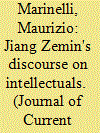|
|
|
Sort Order |
|
|
|
Items / Page
|
|
|
|
|
|
|
| Srl | Item |
| 1 |
ID:
121255


|
|
|
|
|
| Publication |
2013.
|
| Summary/Abstract |
This article focuses on the specific forms of power that are
embodied in the properties and functions of formalised language, as it
was used by Jiang Zemin in crucial political documents on the Party's
policy towards intellectuals. This inquiry illuminates various possibilities
for the normalisation and inculcation of formalised language in the understudied decade of the 1990s, when the mantra "without stability,
nothing can be achieved" became a tautology. The internal constitution
of the selected texts is examined with an eye to the dialogic interaction
with the production and reception of Mao Zedong and Deng Xiaoping's
political discourses on intellectuals (Mao 1942; Deng 1978). The analysis
of language practices and discursive formations in a comparative perspective sheds light on the respective socio�political and historical contexts. It also reveals the extreme involution�devolution of formalised
language in the Jiang Zemin era, when "preserving stability" was reaffirmed as a crucial concern of the Party leadership with the ultimate aim
of preserving its monopoly of power.
|
|
|
|
|
|
|
|
|
|
|
|
|
|
|
|
| 2 |
ID:
140505


|
|
|
|
|
| Summary/Abstract |
Urban transformation in China has been hailed as a revolution. The pace and scale of change as well as the grand narrative of transformation have been characterized in terms of superlatives – the tallest skyscrapers, the largest shopping malls, the longest bridges and highways, the fastest trains – testifying to the teleology and progress of China’s dream of prosperity. However, behind the sleek and glittering façade lies a story of exclusion, violence, dispossession, and destruction – the ruins of a civilization. This article engages with this side of the story by exploring the dialectic between urban transformation and the parallel development of the visual arts, which has created new regimes of visibility and new hierarchies of representation. In new and large cities alike, the visual arts have been manifesting affections that permeate the contemporary world, creating new possibilities for ‘distributing the sensible’. This article focuses on the artworks produced by Zhang Dali, Dai Guangyu and Jin Feng, whose subject matter involves common people, and it engages with three crucial discursive formations: violence, socio-economic inequality, and utopian dreams. These artists are producing a ‘history from below’ (to borrow E. P. Thompson’s expression): rescuing the common people from ‘the enormous condescension of posterity’. They are making ordinary people assume the importance of the extraordinary. From the point of view of aesthetics, they are enacting a total revolution of the senses and, in Rancière’s words, making ‘heard as speakers those who had been perceived as mere noisy animals’.
|
|
|
|
|
|
|
|
|
|
|
|
|
|
|
|
|
|
|
|
|